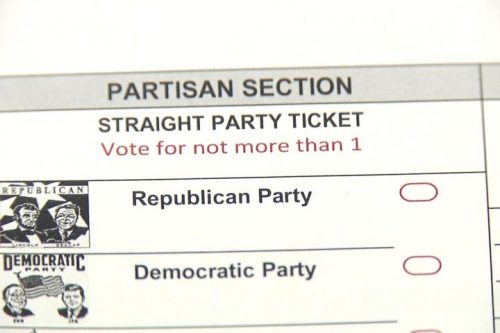
by Jay Wall
One casualty of the partisan rancor in the November elections was the Harris County judiciary. Sitting judges with integrity, high qualifications, and experience were booted out in an election where voter fatigue combined with straight ticket voting to create a Democratic sweep. The situation may well reverse in the mid-term elections when Republican turnout is typically higher and that is not good news, even for those who dislike the result this year. At the state level, Democratic judicial candidates face the same problem. While there certainly should be democratic checks on the courts, the rule of law is not served by a system that turns the judiciary into nothing more than political spoils. It’s time to consider a change for the system of selecting judges.
Fourteen judicial candidates endorsed by the Chronicle editorial board lost elections, many of them by very slim margins in this environment of straight ticket voting and voter fatigue. Over 66{997ab4c1e65fa660c64e6dfea23d436a73c89d6254ad3ae72f887cf583448986} of the votes cast in Harris County were straight ticket, with over 53{997ab4c1e65fa660c64e6dfea23d436a73c89d6254ad3ae72f887cf583448986} of those being Democrat straight ticket. The average judicial race had about 5{997ab4c1e65fa660c64e6dfea23d436a73c89d6254ad3ae72f887cf583448986} undervotes. In an election where the ballot went on for pages, those 5{997ab4c1e65fa660c64e6dfea23d436a73c89d6254ad3ae72f887cf583448986} who knew they didn’t know anything about the candidates were probably the most honest voters in the county.
Debra Ibarra Mayfield, lost her re-election bid by just over 1{997ab4c1e65fa660c64e6dfea23d436a73c89d6254ad3ae72f887cf583448986}. The Chronicle said, “the first Latina judge in the Harris County civil courts at law…[brought] a refreshing openness to the bench.
Clyde Raymond Leuchtag lost by just under 2{997ab4c1e65fa660c64e6dfea23d436a73c89d6254ad3ae72f887cf583448986}. The Chronicle said he had “the steady judicial temperament possessed by the best judges,” and his opponent said, “If I wasn’t running in this race, I’d probably vote for Clyde.”
Twenty year judge Mark Kent Ellis “demonstrated a willingness to learn and evolve on the job that should earn him another term.” It didn’t. Ellis lost by 1.5{997ab4c1e65fa660c64e6dfea23d436a73c89d6254ad3ae72f887cf583448986}.
For the typical voter, the list of judgeships to be voted on in Harris County makes real informed decision making difficult at best. Straight ticket voting is a decent proxy for knowing individual candidates in political races, but we expect a higher standard for judges and that requires a higher standard for their selection.
It’s time to consider a new method for selecting judges. One possibility worth considering is the Missouri Non-Partisan Court Plan. Under that plan a non-partisan commission sends the governor a list of candidates and the governor has 60 days to choose one. After a year in office, the judge faces an up or down vote at the next general election. If he is retained, he serves a full term. If not, a new slate of candidates is chosen by the commission. The plan has been in use in Missouri since 1940 and adopted by several other states, so there is ample experience to adopt an improved version.
Changing the system of selecting judges will require an amendment to the Texas Constitution, but it’s a change that is at least one election overdue. The Chronicle editorial board noted in one race that, “Justice shouldn’t be for sale,” and a review of judicial selection gives us an opportunity to assure that it isn’t. Whether it’s the Missouri Plan, non-partisan elections, longer terms, reducing the number of judgeships on the ballot, or some other method of simplifying judicial elections, this should be a priority for the next legislature.
J.W. “Jay” Wall is a commercial real estate broker, specializing in tenant representation.

I’ve seen partisan wipe outs since 1982, then the first Republican judges in Harris County were up for their first election. I saw a fine, respected court of appeals justice lose to an incompetent who, on election day, was under charges for indecency for getting a handjob from a female client in the Harris County Jail. I saw another good Republican lose to a Democrat guy whose highest and best use was making poodles out of balloons in the basement coffee shop of the criminal courthouse.
It happens in cycles. The problem is that a lot of the times the citizens of Harris County are the losers.
We have 59 district judges, 18 court of appeals justices, 4 county civil court at law judges and 16 county criminal court at law judges on the countywide ballots. I’m at the courthouse every day and I don’t know a lot of the district judges on the ballot. For a while in the 80s, there was an unspoken agreement that good judges would be left alone and allowed to run unopposed. That’s gone and every judge gets an opponent every time now.
And, at one time, the Gay Political Caucus did a great job in picking candidates from both parties for judicial offices. Now, it’s always the Democrat because Republicans are afraid to ask the the caucus’ endorsement.
Some of the judges who win in top of the ballot landslides turn out to be good judges. I am think of a Democrat who won in 2008, beating one of the best judges in Harris County history. The new Democrat has grown into a pretty darn good judge. On the other hand, I’ve seen clowns beat good judges and remain clowns their entire tenure on the bench.
The worst part about partisan election of judges is the judges remember they are elected on a partisan ticket. They’ll never admit it, but their decisions are shaded by fear of an opponent killing them when they come up for reelection based on a single ruling. It takes a brave judge to risk his career by ruling against the state in a high publicity criminal case.
I am told Lt. Gov. Patrick has wanted judicial races off the straight ticket pull for years, even before his son, Ryan, lost his reelection because of it. And, Judge Patrick was one heck of a fine judge.
Being a judge isn’t like being a legislator, congressman or count commissioner. It takes a judge about four years to learn the job. It is a career job and a job we want held by career people who are willing to take a pay cut — often substantial — to do the job. They should take the job with the knowledge they will be able to make their mortgage payments and send their kids to college.. We already have too many judges who run to get a steady paycheck that is a lot more than they’re making in practice.
I don’t know if the Missouri plan is the right way to pick judges. I do know that what we’re doing is the wrong way.
No judge should ever be chosen on a partisan basis. Nor should the sheriff, the district attorney, the district clerk, and all the other non-legislative offices..
Whether it’s the Missouri Plan, the California system or some other system by which non-legislative office candidates can run as Democrats or Republicans, but are elected on a non-partisan basis, Texas has long needed a constitutional amendment to change the ridiculous system we have in place now.
By legislative office candidates I mean for example a mayor, city council members, county commissioners, members of the state legislature and members of Congress, The County Judge’s office can be partisan, but only if he is prohibited from serving in a judicial capacity.
As for getting our state constitution amended to adopt the Missouri plan, it’s not about to happen. Our present partisan system is planted firmly in concrete.
All of the Republican Criminal District Court Judge’s continue to hide the names of their grand jurors in violation of State Law and the opinions of 3 Attorney Generals. Two of the AG’s went on to become Supreme Court Justices. I am NOT at the courthouse every day. I will continue to work to remove every Judge with such an order. Currently, Brad Hart is the only Judge who does not have such an order. If anyone sees Devon Anderson or Patricia Pollard, please tell them Don says hi.
Who appoints the MO ‘non partisan commission’ which sends a list of ‘qualified possibles’ to a very partisan governor for appointment?
Under the Missouri Nonpartisan Court Plan, a nonpartisan judicial commission reviews applications, interviews candidates and selects a judicial panel. For the Supreme Court and Court of Appeals, the Appellate Judicial Commission makes the selection. It is composed of three lawyers elected by members of the Missouri Bar (the organization of all lawyers licensed in this state), three citizens selected by the governor, and the chief justice, who serves as chair. Each of the three geographic districts of the Court of Appeals must be represented by one lawyer and one citizen member on the Appellate Judicial Commission.
Each of the circuit courts in Clay, Greene, Jackson, Platte, and St. Louis Counties, and the city of St. Louis has its own circuit judicial commission. These commissions are composed of the chief judge of the court of appeals district in which the circuit is located, plus two lawyers elected by the bar and two citizens selected by the governor. All of the lawyers and citizens must live within the circuit for which they serve the judicial commission.
Back in the seventies I personally knew both candidates seeking the US Attorney’s district appointment.
Being reminded of the political deal making that went on then, direct election of judges may not be perfect, in individual cases not good at all, but it beats whatever is second, third or fourth. Imagine if every judge candidate on the ballot was there as the result of inside deal making. Direct election on a non-partisan basis may work, but I can already see the voters with their partisan lists at the polls.
How about letting judges run as multi-party candidates?
The well regarded ones can win the support of both parties.
The hacks will get challengers.